You have a visually stunning website filled with impeccably written content. People should flock to your site, right? If you aren't getting the traffic you would like, you need to better optimize your website for search engines. First-page placement on keyword search results is essential. To reach that goal, you can hire an SEO expert to optimize your website, or you can let CommonSpot do the heavy lifting for you.
CommonSpot’s SEO capabilities enable you to add content to a page and easily optimize it for search engines as you go. Once published, your content will be customer- and SEO-friendly offering the engaging user experiences that search engines reward.
Features
Optimize Your Site For Search Engines
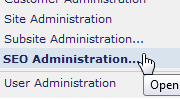
Optimize Your Site For Search Engines
Optimize for search engines as you create your pages. CommonSpot's built-in SEO capabilities make it easy to effectively direct and increase the amount of search engine traffic to your site using tools that help you quickly and easily target and manage keywords, track rankings, and analyze and optimize your site for high performance results.
Read moreMake URLs Human Readable
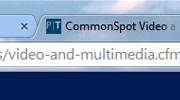
Make URLs Human Readable
Create Human Readable URLs (domainname.com/URL) instead of using auto-generated URLs (domainname.com/product/URL. index.html?id=246247896234) to tell search engines the page name is unique and meaningful.
Read morePreserve Search Engine Rankings Using 301 Redirects
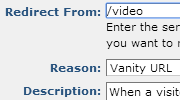
Preserve Search Engine Rankings Using 301 Redirects
Create 301 Redirects when moving pages. This informs search engines that the new URL is the official URL for that page going forward. Search engines will update indexes and transfer the weight and score from the old URL to the new one, preserving search engine rankings.
Read moreCreate Easy To Remember Vanity URLs
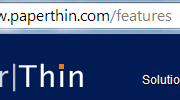
Create Easy To Remember Vanity URLs
Create and manage short, easy-to-remember URLs for any purpose with a few clicks of the mouse, anytime and manage target pages without IT support or resources.
Read moreIndicate Content Hierarchy Using Heading Tags

Indicate Content Hierarchy Using Heading Tags
Apply Heading Tags to your content such as <h1> and <h2> to provide page definition and structure. Heading Tags are read by search engine algorithms to determine relevance between content and the header associated with it. A good semantic structure is important for search engines to better interpret the meaning of your content.
Read moreMake Content More Findable Using Site Maps

Make Content More Findable Using Site Maps
Use Site Maps to tell search engines where your content is located and also to help site visitors find what they are searching for. CommonSpot’s Site Map dynamically updates when pages change.
Read moreUse Breadcrumb Navigation To Communicate Website Structure

Use Breadcrumb Navigation To Communicate Website Structure
Use Breadcrumb Navigation to make your site more trustworthy and positively impact search engine rankings by providing structure to your website that search engines can analyze easily.
Read moreUse Links To Relate Pages And Content

Use Links To Relate Pages And Content
Create Links to help search engines discover which pages are most popular, how pages are related to each other, and in what ways to improve search engine rankings. Use a Link Text Report to easily scan pages to determine if link text is human readable and therefore much more useful to search engines.
Read moreIncrease Your Social Score With A Blog

Increase Your Social Score With A Blog
Maintain content freshness and frequency with a Blog to get your content crawled and indexed more frequently by search engines. More blog posts equals more social shares and more links creating valuable exposure which indicates to search engines that your website is a credible source resulting in better search engine rankings.
Read moreImprove Video Search Engine Rankings

Improve Video Search Engine Rankings
Easily host Video content on your server or externally with third-party video platforms such as YouTube or Brightcove. Tag and classify videos, categorize them by media sources, create video playlists, and re-use video content anywhere across your website to help search engines find and index videos.
Read moreUse Social Media To Increase Rankings With Social Signals

Use Social Media To Increase Rankings With Social Signals
Publish and Share content easily in one click of the mouse. Alternatively, use the Social Media Manager to promote social sharing of content across multiple social media channels—such as Facebook, Twitter and LinkedIn—which creates social signals that help search engines determine content relevancy. Content that is shared widely is more likely to be promoted in search results.
Read morePublish Content And Share It Socially In One Click
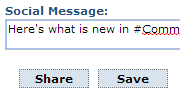
Publish Content And Share It Socially In One Click
CommonSpot enables authorized contributors to either submit their content, or 'Submit and Share' it with popular social media sites (Facebook, Twitter, LinkedIn, and so on) without having to navigate away from your website for faster social media publishing.
Read moreOptimize Page Performance for Google
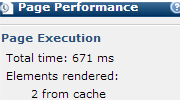
Optimize Page Performance for Google
High-performance SEO requires fast load times. Your website should load in fewer than four seconds. Anything north of that number can lower your rankings and discourage return visits. If your website delivery speed is less than optimal, you need to find and fix the problem. The good news is that CommonSpot gives you everything you need to do both.
Read moreUse Metadata To Maximize Content Value
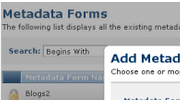
Use Metadata To Maximize Content Value
Tagging your content is essential for managing it your way. CommonSpot captures a standard set of metadata automatically, including date, file location, owner, etc., and includes extensive support for custom metadata for content organization, targeted filtering and presentation and even navigation.
Read moreDynamic and Cached Content

Dynamic and Cached Content
CommonSpot was built from the ground up to efficiently deliver dynamic, interactive content. Intelligent caching reduces database lookups to minimize wait time, while advanced features, tools, and utilities help sites tune performance for their specific needs.
Read moreSearch Engine Result Page (SERP) Rank Tracking
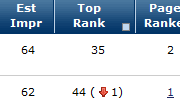
Search Engine Result Page (SERP) Rank Tracking
CommonSpot's SEO Management capabilities provide built-in SERP (Search Engine Result Page) rank tracking for Google and Bing search engines. You can schedule search engine queries to track keyword rankings on a daily, weekly, or monthly basis, or set your own custom tracking period. You can also maintain ranking archives to view reports on ranking changes over time.
Read moreSearch Engine Optimization (SEO) Page Grade Rules and Recommendations
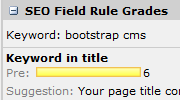
Search Engine Optimization (SEO) Page Grade Rules and Recommendations
CommonSpot ships with over a dozen SEO Page Grade Rules (and you can add your own through our new API), that grade the content, properties and URL of your pages to optimize them for SEO. Once you assign and configured these SEO Rules for your site, Content Contributors and SEO Administrators can see each page/document’s overall grade and recommendations for improving SEO.
Read more